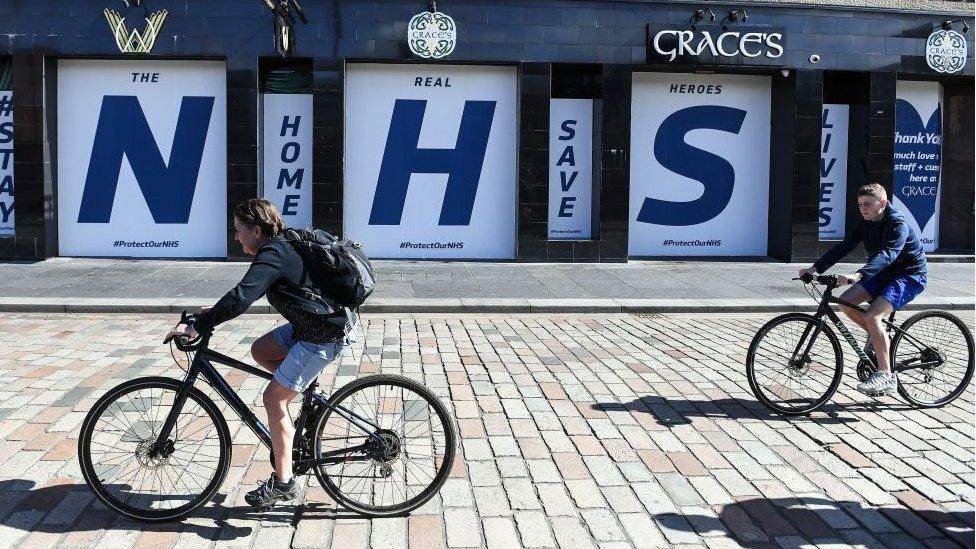Coronavirus: 'Your new bike won't be in stock until 2021' - the cycle search frenzy
- Published
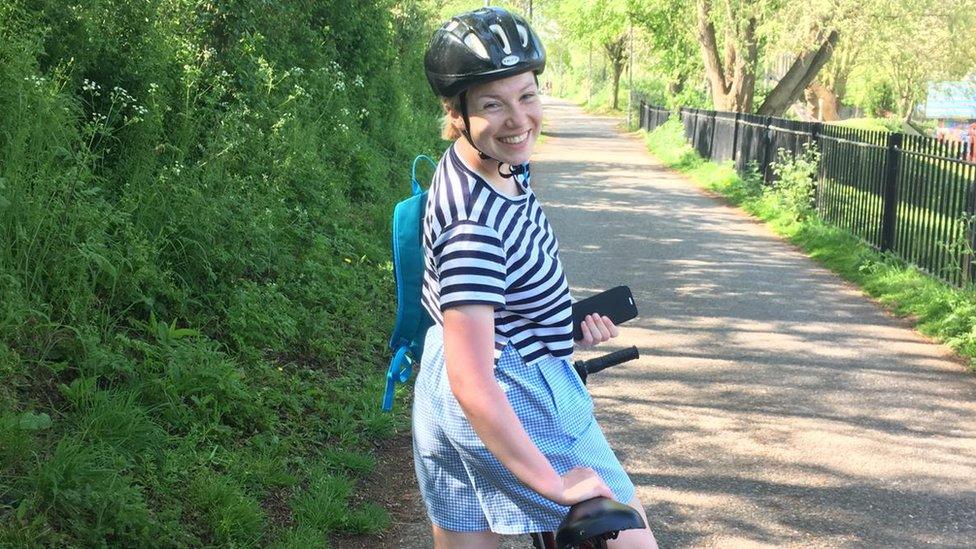
Saskia Breet was told she could pre-order a bike after other models sold out - but that it might not arrive until January
Toilet rolls. Hand sanitiser. Pasta. Flour. The early pandemic-induced shortages have passed, but now there is a new one: bicycles. As people venture further afield for exercise, or return to the workplace while avoiding public transport, bikes - new and used - are at a premium, write Alice Evans and Ella Wills.
Teacher Saskia Breet had to abandon any hopes of a jaunt to a foreign land this coronavirus-affected summer - but dreamed of getting on a bike and exploring the world around her.
There are plenty of sights to savour within comfortable cycling distance of her Bristol home - but first the 26-year-old needed to buy a bike. She soon found that task was harder than any homework assignment she sets for her secondary school pupils.
Because she plans to follow government advice and use pedal power to get to and from work when her school fully reopens, Saskia signed up to the cycle-to-work scheme, which allows employees to buy tax-free bikes and equipment.
"I finally just bit the bullet and thought, well I may as well - there's quite a lot of money to be saved and I've got time [to cycle a lot]," she says.
Saskia, who has been working from home during lockdown, is "really looking forward" to cycling to school in September. It will be an easy 10-minute pedal down the city's famous Park Street in the autumn mornings - and she's even keen about the prospect of the "slightly more painful" uphill return trip.
So the languages teacher began looking for bikes to buy in mid-May but the hunt soon became "frustrating".
"When I rang various different bike shops around Bristol - some big brands like Trek, and some smaller independent shops - they all just said either 'it's completely sold out and we're not getting any more stock this year', or 'we don't know when we'll have a new shipment for that particular model'," she says.
Recent high demand has meant Trek has sold out of the 2020 models of most of its bikes earlier than expected. It has made 2021 models available to pre-order but customer service staff told the BBC: "If you were to place a pre-order now the stock would likely arrive in January."
Smaller retailers that have already pre-ordered stock might be selling those models earlier, they added.
Late-night scramble
Giving up on Trek, Saskia found a "really good value" bike on the website of the French sports retailer Decathlon.
She added it to her online basket and spent a bit of time browsing for other items, such as inner tubes and a cycling jersey. But when she went to the checkout, an error message popped up - the limited capacity of the number of bikes available that day had been reached, so she could not complete her order.
"It told me to log back on at 11pm [when] it reset the meter. So I did that two nights in a row, with no luck - it just sold out immediately," she says.
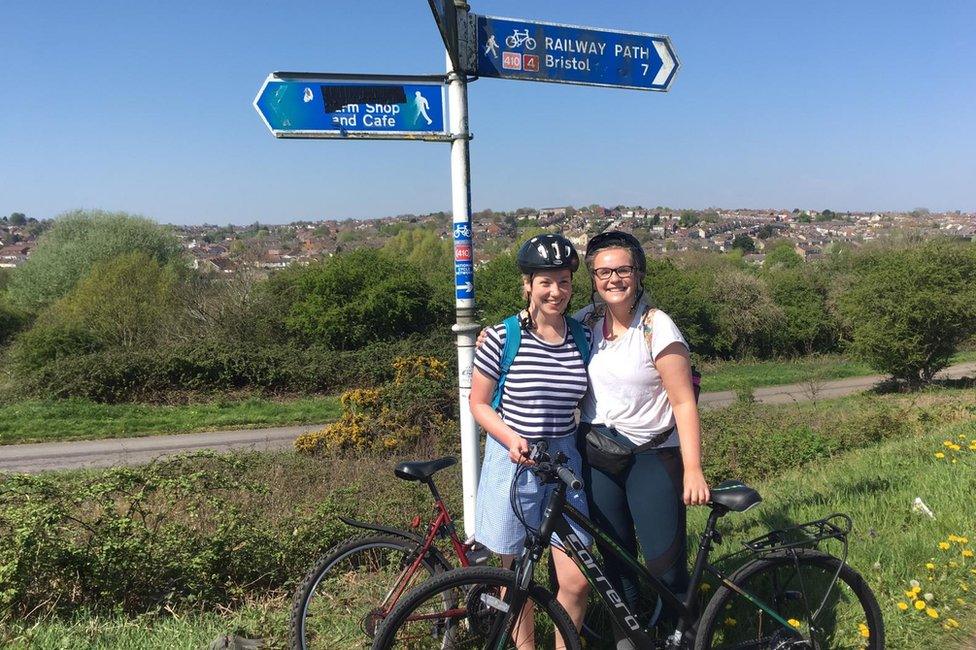
Saskia (left), a teacher, is hoping to venture out of Bristol on her new bike during the school holidays
She took her search elsewhere and after finding no suitable bikes in stock on Wiggle, Rutland Cycling, or Halfords, Saskia eventually managed to order one from Evans Cycles.
Four weeks after ordering the bike, Saskia was finally told it was ready to pick up. "Whether that's normal, I don't know - but my hunch is it's just this particular time is making it really tricky."
Saskia's hunch is correct; bike shops across the country have struggled to keep up with what many have described as "unprecedented" demand.
The Bicycle Association's executive director, Steve Garidis, says initial figures from across the UK industry show sales of bikes below £500 have been "especially strong" since lockdown - as well as for products such as home turbo trainers.
Peter Skelton, from bike shop chain Cycles UK says the entire industry was "caught off-guard" by the increase in demand for bikes and that most UK distributors have run out of any bikes under £1,000. But he adds that Cycles UK has been "pretty lucky" as stock from Europe is slowly arriving. He expects supply to be at "near-normal" levels in August.
When told about Saskia's experience using its site, Decathlon said it was "working hard to find solutions" after "extremely high demand" for many of its bikes.
Peter Lazarus, the company's cycling chief, says he was "expecting doom and gloom" for his firm when the pandemic forced it to close all of its stores across the world, and rely on online sales only.
But after 23 March, when the UK went into lockdown, "there was a dramatic shift like someone switched on a light" - and sales surged.
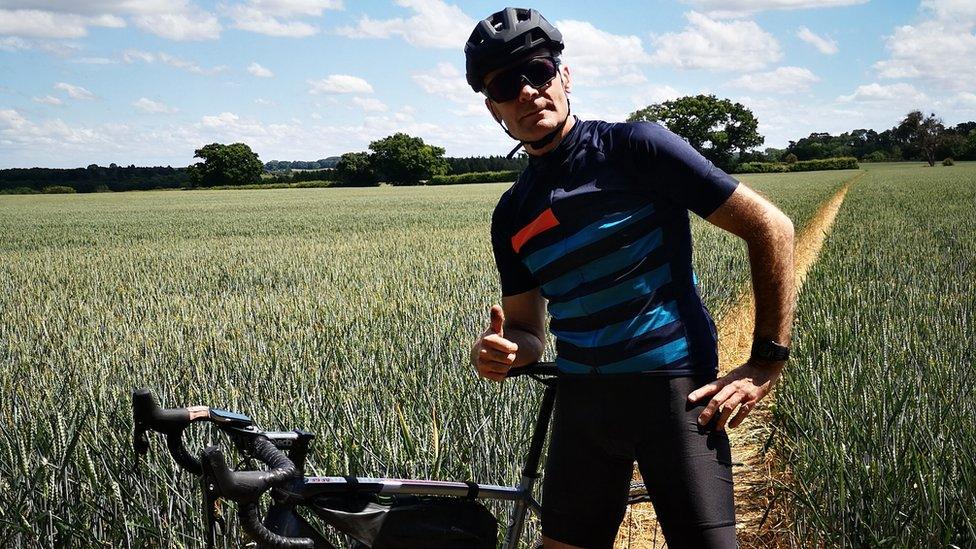
Peter Lazarus, cycling market leader at Decathlon, says he saw an "exceptional spike" in bike sales when the UK went into lockdown
The firm "suffered in the short term" because some factories closed temporarily, affecting Decathlon's ability to cope with an "exceptional spike" in demand. Online bike sales in May more than doubled compared with last year. "You can't forecast growth of 200%, it's impossible," Peter says.
He said Decathlon's production is now "ramping up" so that, by July, low to mid-range bikes will be "back to availability".
'I had to order parts from the Netherlands'
Peter says people's urgent desire to revamp "dead bikes" that had been gathering dust before lockdown had contributed to a five-fold increase in spare part sales in May, compared with May 2019 - the "biggest growth we have ever had".
The boom in demand for spare parts was a spanner in the works for Claudia Watts, a data ecologist using her time on furlough to do some DIY on her old bike.
The 57-year-old, who lives on the Isle of Dogs in east London, hasn't used her bike much since she broke her nose cycling in London more than 10 years ago.
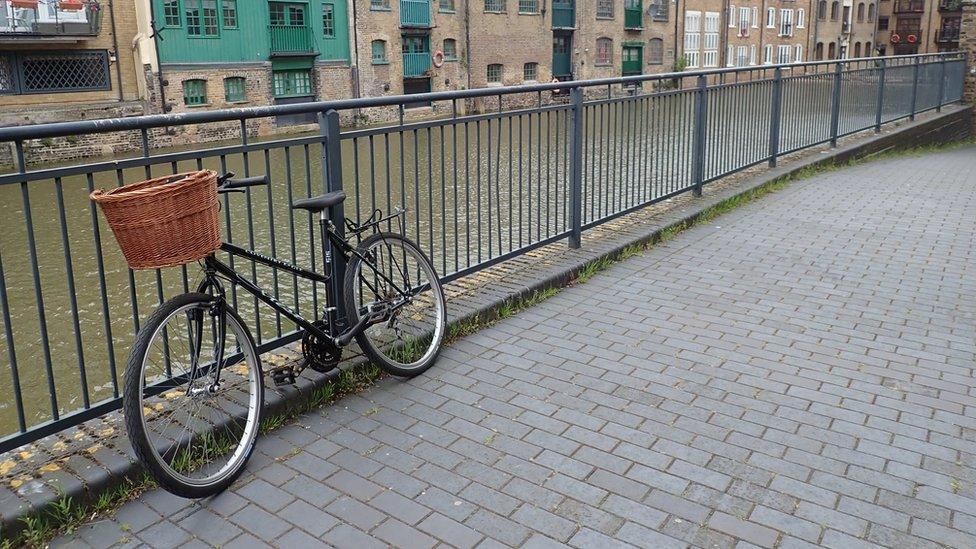
Claudia Watts said her "serious cyclist" friends were "horrified" when she decided to add a basket to her mountain bike to help carry shopping
But when lockdown rules demanded people only exercise close to home, Claudia decided it would be easier to maintain social distancing on a bike than on a walk. "I live on a really busy footpath with lots of people going past, it's quite narrow. And I thought a bike would get me a bit further afield. You can go further and see more."
She retrieved the old bike from the garage and was "a bit dubious" about its condition, having been collecting dust for a while. It looked "fine" but was "completely covered in muck".
After a thorough clean, a degreasing and a regreasing, Claudia set about repairing two punctured tyres.
Transport Secretary Grant Shapps has said social distancing will be easier on public transport if more people walk or cycle
She could not find the replacement tyres she needed in stock on any website in the UK, so ended up ordering them - along with some inner tubes - from the Netherlands.
Claudia was "really surprised" that the Dutch delivery only took a few days to arrive at the end of April, amid the peak of the epidemic when many supply chains and delivery services were choking on a backlog of orders.
While people like Saskia and Claudia waited patiently for deliveries, others took more drastic measures to get their hands on a bike. The insurer, Admiral, reported a 46% increase in claims for bike thefts, external for the first seven weeks of lockdown, compared with the same period last year.
One victim of bike theft is Lucy Stickland, a physiotherapist helping coronavirus patients to recover after they return home from hospital.
The 26-year-old said she felt "violated" when she realised her bike had been stolen as she bought food from a Sainsbury's in Brixton, south London, on her way back from work.

Charities giving bikes to NHS workers told Lucy Stickland there were none left, after her bike was stolen
She had begun cycling into work every day after her car broke down. She has tried to avoid contact with people throughout lockdown, due to fears for the "really vulnerable" patients she works with - and therefore decided not to get the car fixed.
Luckily for Lucy, she has been able to borrow a bike from her friend's brother. She wants to be able to give it back but has not managed to find a replacement.

SOCIAL DISTANCING: The rules as they are now
PUBLIC TRANSPORT: Is it safe to travel?
TRAVEL: Can I get a holiday refund?

Companies such as Brompton Bikes, external, Buzzbike, external and the Green Commute Initiative, external had all launched schemes to give or lend bikes to NHS workers during the pandemic - but none were available when Lucy inquired.
Lucy has also been bargain-hunting on Gumtree and Facebook Marketplace - "but the ones on sale in London go so quickly". She said friends have told her you must "be ready" for bike ads on second-hand sites, and that the bikes will sell within half an hour of ads being posted. "They're all just getting snapped up so quickly," she added.
For now, Lucy will simply have to keep trying. But as the government has pumped money into cycling and walking infrastructure to encourage people to avoid public transport, it's likely that bikes will retain their gold-dust status for some time yet.

SAVING OUR NURSES: Go behind the scenes at A&E
THE NEXT MUST-SEE DRAMA IN LOCKDOWN: The Salisbury Poisonings

- Published7 May 2020
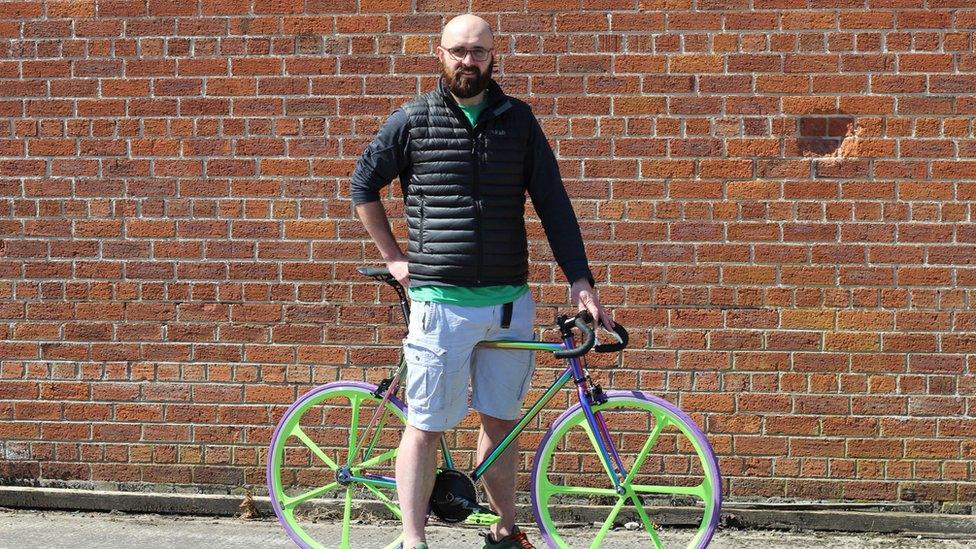
- Published2 June 2020
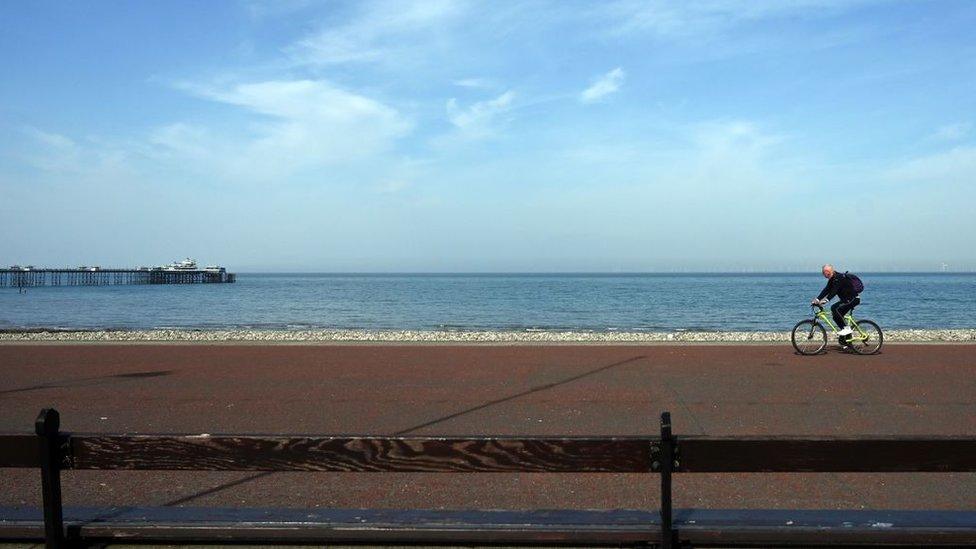
- Published18 April 2020
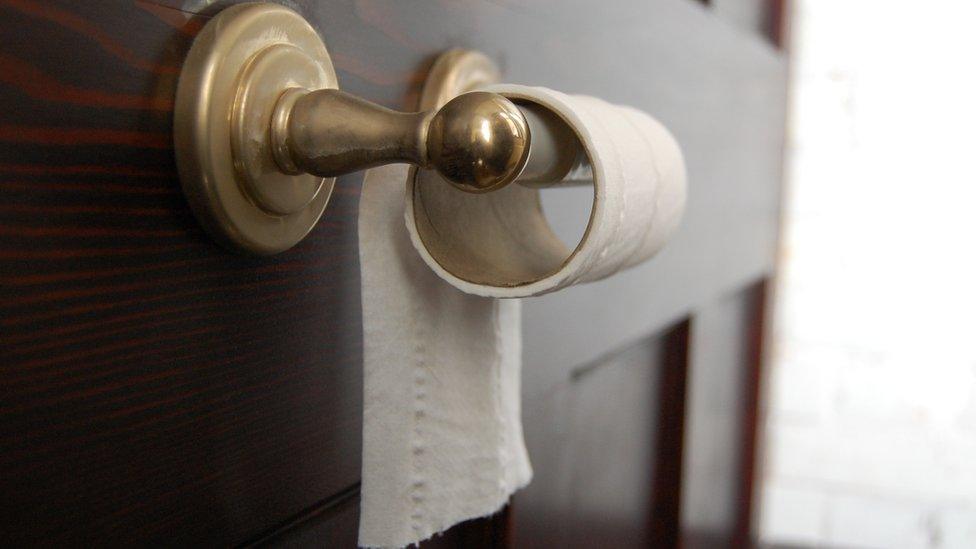
- Published16 April 2020

- Published13 April 2020
